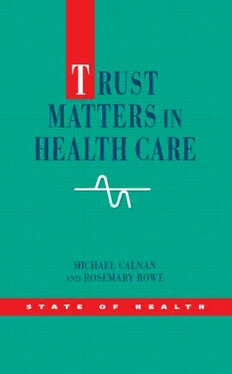
Trust Matters in Health Care (State of Health) PDF
223 Pages·2008·2.883 MB·English
Most books are stored in the elastic cloud where traffic is expensive. For this reason, we have a limit on daily download.
Preview Trust Matters in Health Care (State of Health)
Description:
Does trust still matter in health care and who does it matter to? Have trust relations changed in the 'New' NHS? What does trust mean to patients, clinicians and managers? In the NHS trust has traditionally played an important part in the relationships between its three key actors: the state, health care practitioners and patients. However, in recent years the environments in which these relationships operate have been subject to considerable change as the NHS has been modernised. Patients are now expected to play a more active role, both in self-managing their illness and in choice of care provider and clinicians are expected to work in teams and in partnership with managers. This unique book explores the importance of trust, how it is lost and won and the extent to which trust relationships in health care may have changed. The book combines theoretical and empirical analysis, while also examining the role of policy. Calnan and Rowe analyse data collected from interviews with patients, health care professionals and managers in primary care and acute care settings. Among the issues covered are: The importance of trust to their relationships What constitutes high and low trust behaviour The changing nature of trust relations between patients, clinicians and managers How trust can be built and sustained How interpersonal trust affects institutional trust Trust Matters in Health Care is key reading for policy makers, health care professionals and managers in the public and private sector, and a useful resource for educators and students within health and social care and management studies.
See more
The list of books you might like
Most books are stored in the elastic cloud where traffic is expensive. For this reason, we have a limit on daily download.
